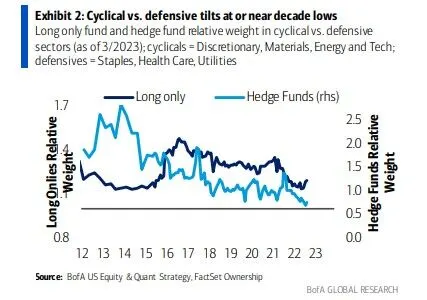
As Wall Street economists and central bankers debate if and when the US economy will slip into a recession, big money managers aren’t waiting to find out.
Increasingly, professional stock pickers are shifting money out of economically sensitive shares like banks while parking it in stocks seen as resilient during economic downturns, such as utilities and consumer staples.
Hedge funds that make both bullish and bearish wagers have cut their cyclical holdings versus defensive equities to the lowest level since at least 2012, data compiled by Bank of America Corp. show. For long-only managers, their relative exposure to cyclical companies — whose fortunes hinge on the ebbs and flows of the business cycle — is near the lowest level since 2008.
It all highlights growing pessimism in the world of active investing, despite a rally that has added $5 trillion in equity values since the market’s October low.
All told, active stock pickers are “positioned for a 2009-style recession,” BofA strategists led by Savita Subramanian wrote in a note.
The S&P 500 swung between gains and losses during Monday before closing little changed. For a second straight session, the index came within 30 points of the widely watched 4,200 level but failed to push through.
The recent preference for defensive equities is a departure from last year when recession fear was raging and active funds were hanging onto a cyclical tilt. That stance signaled faith in the Federal Reserve’s ability to engineer a soft landing with its aggressive inflation-fighting campaign. Now, such confidence is hard to find.
The data on sector positioning adds further evidence about the persistent bearishness among pros. In BofA’s latest survey of money managers in April, cash holdings stayed elevated and bonds were favored over stocks more than any time since 2009.
The defensive posture can set the stage for big rallies when bears are compelled to chase gains — worried about being left behind. That’s what happened on Thursday, when solid earnings from technology firms such as Meta Platforms Inc. overshadowed data showing slowing economic growth and hotter-than-expected inflation. That day, the S&P 500 jumped 2%, and Goldman Sachs Group Inc.’s equity trading desk saw activity picking up.
Long-only funds “were forced in as FOMO buyers as market started to run away from them,” Goldman’s partner John Flood wrote in a note to clients last week.
Notably, the caution among stock pickers contrasts with computer-driven strategies that allocate assets based on chart signals. Thanks to steady gains and a drop in market volatility, systematic money managers such as trend followers and volatility-target funds have boosted their equity holdings in recent months.
The diverging stance is best illustrated by Deutsche Bank AG’s model on investor positioning. According to the firm, quant funds have continued to snap up stocks, while exposure from discretionary investors has fallen to the bottom of its one-year range.
“Systematic strategy positioning rose further towards neutral but has been offset by discretionary investors continuing to be very skeptical of the rally so far,” Deutsche Bank strategists including Parag Thatte wrote.
Bears attributed a big part of 2023’s equity rally to those price-insensitive quant investors where have no choice but to buy stocks when prices go up, warning the multi-month advance is unsustainable. With the S&P 500 having failed in several attempts to break above the 4,200 level, a lack of momentum is likely to put a cap on demand from quant funds. On the other hand, a renewed selloff could drive those rules-based traders to reverse course and exit stocks.
Also bolstering equities were better-than-feared economic data and corporate earnings. Yet while companies have delivered results above estimates this reporting season, it’s not enough to send corporate America back to the growth track, at least not yet. Even Fed officials predicted a “mild recession” starting later this year.
But if history is any guide, getting too early into defensive positioning in preparation for a recession may end up being costly, according to BofA’s Subramanian.
Tracking stock performance based on their historic sensitivity to economic growth, her team found that the 10 most-cyclical industries tended to outperform in the six months leading up to a recession. It’s not until during the actual recession that defensive shares started to shine, although their leadership usually reversed before the end of the down cycle.
“When it comes to recessions, don’t anticipate. Wait,” said Subramanian, adding that BofA economists see a US recession starting in the third quarter.
























